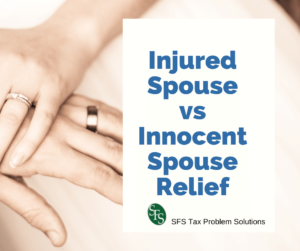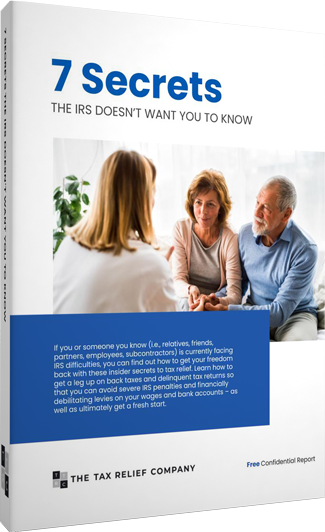I is for Innocent/Injured Spouse Relief – The Takeaway: When you file a joint return, you and your spouse share in the responsibility to pay the tax. The IRS can collect against each of you together or separately. This is called “joint ad several liability.” But what if the tax debt is not yours.
Differences between Injured Spouse vs. Innocent Spouse
Innocent spouse relief might be extended when your current or former spouse fails to report income, reported income improperly, or claimed improper deductions and credits. To qualify as an innocent spouse, the IRS says you must meet all of the following requirements:
- You filed a joint return that had an understatement of tax (deficiency) that’s wholly credited to your spouse’s erroneous item. Erroneous items include the income received by your spouse but omitted from the return, as well as incorrectly reported deductions, credits, and property basis.
- You establish that when you signed the return that you didn’t know and had no reason to know, that there was an understatement of tax.
- Allowing for all pertinent facts, it would be unfair to hold you liable for the understatement of tax.
In summary, an innocent spouse is married to someone who, on their joint tax return, deliberately lied to the federal government by hiding or misreporting income or claimed too many write-offs to lower their tax bill.
If you had no idea about this understatement at the time you signed your tax return form, the government doesn’t think you should be held accountable for the penalty. It might qualify you for innocent spouse relief from joint and several liability.
In contrast, an injured spouse is someone whose tax refund is used to cover the financial obligations of a current or former spouse. You would be an injured spouse if your share of the overpayment shown on your joint return was, or is expected to be, applied (offset) against your spouse’s legally enforceable past-due debts. To be considered an injured spouse, you must have paid federal income tax or claimed refundable tax credit, such as the Earned Income Credit or Additional Child Tax Credit on the joint return, and not be legally obligated to pay the debt of the spouse.
 Rules for Injured Spouse vs. Innocent Spouse
Rules for Injured Spouse vs. Innocent Spouse
If you file a joint return with your spouse, the IRS will not automatically distinguish between you and your partner when collecting tax dollars from either of you, even if your spouse’s debt existed well before the marriage. The IRS has the legal right to offset some or all of a refund to apply to unpaid financial responsibilities such as:
- Federal taxes
- State income taxes
- State unemployment compensation debts
- Child or spousal support payments
- Federal nontax debt, such as defaulted student loans
When the IRS applies a person’s refund to past liability, they will mail a formal Notice of Offset to the taxpayer’s address. At this time, the taxpayer whose refund was seized or offset has the opportunity to file an injured spouse claim.
I is for Innocent/Injured Spouse Relief
Innocent spouses face more severe problems than injured spouses. When you complete a tax return, you sign your return with penalties under perjury. Even if you were unaware of your spouse’s understatement, the IRS counts this misrepresentation as tax fraud and imposes serious consequences for it. Legally, if the IRS suspects fraud in your joint return, the IRS can:
- Impose Penalties and Fees
- Make Criminal Charges
For relief of liability from the above penalties, you can file an innocent spouse claim. The innocent spouse rule stipulates that you must have signed and filed a joint return without full knowledge of your spouse’s real financial situation. Married persons who did not file joint returns, but live in community property states, may also qualify for innocent spouse relief.
When deciding on the situation that is best for you, you need to make sure you know the differences between innocent and injured spouse as they are very different.
SFS Tax Problem Solutions specializes in tax resolution.
Our Certified Tax Resolution Specialist and Advanced Tax Crypto Expert, Jeffrey Schneider, EA, understands the differences and nuances between injured or innocent spouse relief and can guide you in making the correct determination. If you want an expert tax resolution specialist who knows how to navigate the IRS maze, reach out to our firm. If you want an expert tax resolution specialist who knows how to navigate the IRS maze, reach out to our firm. We’ll schedule a no-obligation confidential consultation to explain your options http://bit.ly/2Hh7cEl.


